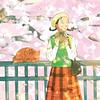Take a photo of a barcode or cover
Plot: 4/5
Characters: 4/5
Writing: 4.5/5
Reverie was one of the most imaginative, chaotic and unique novels I've ever read. It was a wild, wild roller coaster ride of a book but also one that I feel will resonate with many readers and I enjoyed it very much.
"We are all people between worlds."
The protagonist was Kane Montgomery, a boy who woke up half-dead in a river nearby a burnt down mill with no memory of how it happened or most of his life before. However, slowly by surely he began to put the puzzle pieces together by finding his friends from before the accident and uncovering the sinister truth of what really happened.
Kane and his friends (who called themselves 'the Others') all had various superpowers and they used these to control and unravel 'reveries' wherever they arose. Reveries were manifestations of a person's deepest hopes, fears and dreams that leaked into reality and ensnared anyone in the vicinity of their source. They normally came with an elaborate plot that the people caught inside would unconsciously act out but the Others all possessed the ability to remain lucid in a reverie and could make sure it stayed safe and didn't go out of control.
"Sealed off things that steep too long in the human mind are doomed to grow bitter"
The reveries were all well fleshed out and intriguing and the author integrated these magical micro worlds into the real world very skillfully. I thought it was an extremely creative magic system but I would have liked it to be more explained as there are still aspects of reveries that I don't understand like the triggers, limits and rules of them. Also, I don't think Kane and his friends' purpose was well explained because most of the time, they seemed to make the reveries more dangerous than they were supposed to be.
Kane was caring, thoughtful and funny but his accident and the consequent amnesia made him feel like an outsider from himself. Also, his uncertainty in who to trust made him push away those trying to help him and he ended up feeling alone. He was the only openly gay person in his school and he keenly felt the pressure of people's judgement upon him, always feeling out of place.
However, as Kane discovered details about his life the reader did too, making his confusion really relatable. He rediscovered his previous friends and it was lovely to see how, after a bit of miscommunication, he started to rebuild his relationships with them once more. His whole character arc was about self-discovery, about giving himself a second chance and using it to save the world.
"Dreams can be the artifacts we excavate to discover who we really are"
The other characters were all nicely layered as well. I loved Ursula's calm yet strong nature and Adeline's steely no-nonsense attitude. Dean had a mysterious, aloof exterior but was actually really adorable and I'm glad that him and Kane had each other. I wish we got to see their relationship develop more. I also liked how Kane's relationship with his younger sister was portrayed. It was turbulent at times but during hardships their unconditional love and support shone through. The villain of the story was a drag queen sorceress called Poesy who, as the book states many times, was 'power personified'. While her motivations and decisions were very questionable she was a sassy, trinket gathering villain who was hard to always hate.
At its core, beneath the chaos and rainbows, Reverie was a story about how people, especially those ostracized by society, create refuges in their own minds and what happens when these go out of control. With its heartfelt LGBTQ+ representation, beautiful prose and loveable characters, Reverie is most certainly a worthwhile read. I had a few issues with the magic system but it was overall an enjoyable story.
Thank you to Sourcebooks Fire for providing me with a review copy of this book in exchange for an honest review. All opinion expressed are my own.
Graphic: Violence, Blood
Moderate: Bullying, Emotional abuse, Car accident, Fire/Fire injury
Minor: Homophobia, Sexism, Outing
That makes it hard to want to go back and have to revisit Kanji's not-gay gayness or Naoto's not-trans transness, knowing that my more critical eye will shred much of what I remember fondly about those characters, who I loved and who made up my main party through most of my original playthrough. My understanding of sexuality and gender roles is much more robust now than it was then, but that means I know Persona 4 will not be able to withstand that kind of scrutiny. Nor should it - Persona 4 is very much deserving of criticism. I'd just prefer it if someone without my fond memories did the criticizing. I'm lucky that Persona 5 was a much less flawed game (though it still had a little bit of queerphobia that was thankfully removed in Royal), so I'm not super starved for Persona 4 as its sequel is literally my favorite game of all time. But even then, there's something special about 4 that I'd like to return to and never will.
I picked up Ryan La Sala's 2019 novel Reverie at random because I wanted a YA fantasy to rebound after having read some pretty dense stuff. The summary described it as a queer contemporary fantasy with an amnesia element to it and that all sounded fun enough to be worth reading. And it is fun, and worth reading! What surprised me about it, though, was just how many similarities it had with Persona 4. While the amnesia element means it takes a little time to work it out, ultimately Reverie is a story about a friend group of small-town misfit teens who enter pocket dimensions based on the subconscious minds of different townspeople and dismantle those dimensions, using powers based on the aspects of themselves that they're ashamed of. That's just Persona without the Jungian terminology. Several of the characters, too, share similarities with characters from Persona 4: especially Ursula, who is ridiculously similar to Chie. If you told me this book started as Persona 4 fanfiction and then got rewritten into someone publishable, I'd believe you. And that's not a bad thing!
Fascinatingly, though, Persona doesn't come up in the author interviews I've read. La Sala is a big fan of anime and Japanese video games, but while he talks about Sailor Moon and Kingdom Hearts and Madoka Magica, I haven't found mention of any Persona games. It could very well be that the two works just share some inspirations and that was enough for them to hit so many of the same beats. At the very least, I'd recommend La Sala try playing some of the Persona games if he hasn't, since they clearly play with elements he enjoys.
But I'm focusing so much on the similarities between this book and that game here because of what the book does that the game fumbles. Reverie is very queer: I can think of seven major queer characters off the top of my head, and I'm probably forgetting some. That's a real strength to a story about exploring realities built out of the subconscious world, because it invites the reader to explore the ways our outdated conceptions of gender and sexuality affect us on a subconscious level, and the very real desire for realities that would allow people to live authentically. I really wish Persona 5 had had an openly queer party member or at least confidant for that reason. It may be a game about people pushed to the fringes of society, but its unwillingness to engage much with queerness undermines some of that theming. Reverie, on the other hand, focuses fairly heavily on the queer side of that coin. It talks about the difficulties of living as an elder queer, the bullying that younger folks have to endure, and -especially - how unfair it is that we can't just raze all the false hegemonies to the ground and start over fresh. And it does that with likeable characters exploring colorful and imaginative worlds.
That's not to say the book is flawless. Protagonist Kane is surly to a point that's honestly annoying. While it's an interesting hook that he has amnesia and has to rediscover his friends and his place in their friend group, it's irritating how often he arbitrarily decides they slighted him somehow and starts a fight. On at least six different occasions, he gets friendly with them, catches himself, says something really cruel to purposely push them away, and sets their relationship back to square one in doing so. If I wasn't so interested in seeing what the book would do with its Persona elements, I probably would have put it down after the first three or so. It's especially frustrating because I do like Kane as a character. Those moments felt fabricated, and not even really accurate Kane's own characterization, to the point that he often wonders why he was so mean right after each incident.
Reverie is also a little too short for the story it wants to tell. Maybe I partly feel that way because Persona 4 was over 100 hours, but I do think there was room for a slower burn bringing the friend group together a little more organically and allowing for the exploration of a wider variety of pocket dimensions. I think this story and these characters would have had more wiggle room over two books, and I'm not usually one to push for sequels. But it could have used more time - and honestly especially more downtime - to breathe, and I'm a little sad it didn't get that.
Those hangups aside, though, I'm glad I read Reverie. It's a fun little novel that plays with elements I clearly very much enjoy, and it was able to fill a void left by a game that meant a lot to me, once. Can't ask for much more than that.






